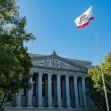What did the Archdiocese know about child molestation by its priests, when did they know it, and what did they do about it?
Seven plaintiffs sued the Archdiocese of Los Angeles for “vicarious liability” and negligence for failing to protect children from sexual harm they knew was occurring. The Church responded by filing an anti-SLAPP (Strategic Lawsuits Against Public Participation) motion. They claimed plaintiff’s case must be dismissed because the Archdiocese was exercising its First Amendment right not to speak when it failed to take action against a priest. Their conduct (or lack of conduct) they argue, was “protected speech.”
In a unanimous three-judge opinion written by Presiding Justice Lawrence D. Rubin, the California Court of Appeals for the Second District’s Fifth Division disagreed with the Archdiocese on May 19. It concurred with the order issued by Judge Elizabeth R. Feffer of the Los Angeles Superior Court. The case had been heard and decided by Rubin in 2021, went to the California Supreme Court, and was returned to Rubin earlier this year.
“The suit against the Archdiocese is not (about) speech – it is the molestation and failure to supervise,” Rubin said in his decision regarding the legality of the anti-SLAPP motion.
The Court’s opinion begins with five pages containing chilling, detailed accounts of the molestation of each of the seven plaintiffs (Does 1-7). Charles Ratcliffe, Jr., the first plaintiff, is named, but some of the others preferred to remain anonymous. It explains how and why the Archdiocese knew that one of their priests had molested over 20 children.
The court responded to complaints against Father Christopher Cunningham by issuing a “policy” designed to prevent all priests from “sexualized conduct… and grooming activities.” But when Cunningham’s abusive sexual practices against multiple children were reported, he was ordained anyway. Over the next ten years, seven young boys and others who elected not to sue were victims of the Father’s recurring criminal behavior in four different parishes. He continued his abhorrent activities, which included wrestling, hugging, kissing and rubbing against young boys. The Church responded by issuing another “policy.” This one required church personnel who knew about suspicious behavior to “confront the violator and report the violation.”
Despite these policies, Cunningham was not confronted, reported, or punished. Instead, he was promoted and later transferred to a fifth church, where he continued to molest his minor parishioners. When discovered again, he took a leave of absence, during which he and 12 of his attorneys remained on the Archdiocese’s payroll. After a civil suit by a different plaintiff (Roe) resulted in a payment of a “life-changing amount,” the Los Angeles County Sheriff’s Department began a criminal investigation. In 2019, Does 1-7, plaintiffs in this suit, filed a complaint with three causes of action against the Archdiocese.
The complaint alleges that the Archdiocese, “through its agents and managing agents,” knew about Cunningham’s routine violations of Church policies against molestation. Plaintiffs’ first cause of action, for “Child Sexual Abuse/Sexual Battery,” claims that the Archdiocese is vicariously liable because it “authorized and ratified the abuse” by keeping Cunningham on its payroll and paying Cunningham’s attorneys’ fees.
It charges the Church with “concealing evidence” that could have stopped the child molestation. Instead, it said the Archdiocese and its agents were “condoning the conduct” by transferring offending priests to new churches multiple times. This behavior “allow(ed) child molesting priests to escape prosecution” and protected both their reputations and the reputation of the Church.
The second cause of action charges the Archdiocese with negligence. Plaintiffs claim the Church has a “special relationship with the children entrusted in its care” that gives rise to a duty to protect them from harm. It says defendants “knew or reasonably should have known” about “Cunningham’s dangerous and exploitive propensities” and that their failure to take action against him made young boys vulnerable to sexual abuse. Plaintiff Does say this duty of care was breached by continuing to employ Cunningham and allowing him to have regular contact with young boys in many venues, including his room as well as hotel rooms.
The final cause of action states that the Archdiocese’s duty of care was also breached by its failure to circulate its molestation policies through its community of worshipers, parents and educators, who are “mandated reporters under the California Penal Code.”
The Archdiocese demurred to all causes of action based on anti-SLAPP laws. Rubin’s opinion explained that the burden is on the plaintiff(s) to show they have a “probability of prevailing” or their claim will be dismissed. If the defendant can show that the plaintiffs’ claims are based on “protected activity,” the burden will switch back to the plaintiffs to show their lawsuits have minimal merit.
The negligence motion was based on “a decision not to speak, not on the speech itself.” Rubin agreed with the Archdiocese that the constitutional right to free speech includes the right not to speak. However, he said, “not every decision to refrain from speaking falls within the anti-SLAPP suit’s definition of protected activity.”
Four categories of speech are protected, Rubin wrote. These include written or oral statements before governmental bodies, including the courts, in public forums, or “in furtherance of the exercise of the constitutional right… of free speech...”
The Church claimed the sexual abuse charges against Cunningham were made during the course of Roe’s litigation, which took place during litigation in court. Rubin said the Archdiocese was “cherry-picking allegations” about speech made during litigation and concluded this speech was “incidental to the actual allegations” of the main complaint about the Church’s behavior.
“We conclude the failure to speak alleged as a basis for liability here is not conduct in furtherance of the right of free speech,” the opinion stated. Defendants failed to identify a claim based on protected speech, and the case will now proceed with the Archdiocese paying costs.






